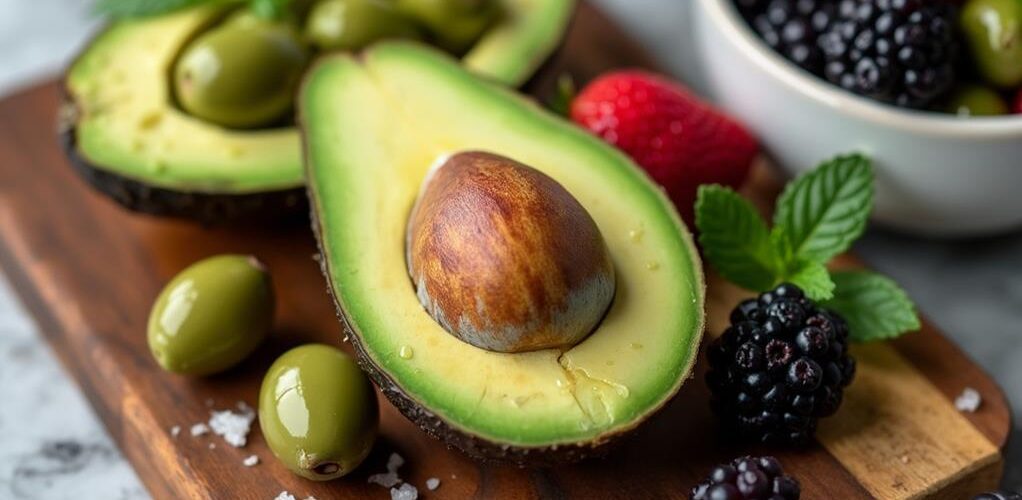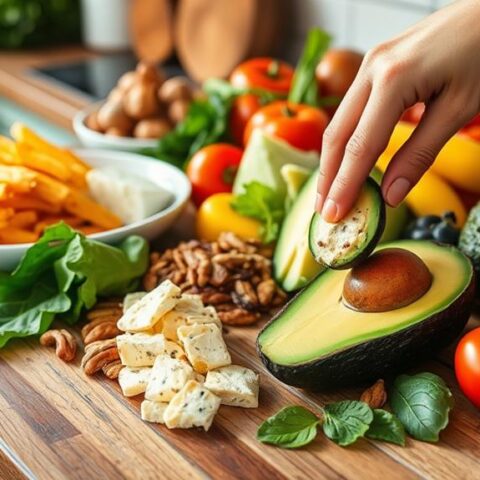
For those on a ketogenic diet, incorporating fruits can be both delicious and beneficial while maintaining low carbohydrate intake. Avocados, strawberries, lemons, tomatoes, raspberries, blackberries, and watermelon each provide low net carbohydrates and are rich in essential nutrients. Avocados offer healthy fats and potassium, while berries like strawberries, raspberries, and blackberries are packed with antioxidants and fiber. Lemons and tomatoes add a burst of vitamin C and lycopene, promoting overall health. Watermelon, although slightly higher in carbs, is excellent for hydration and vitamins A and C. Exploring these fruits can enhance your diet with flavor and nutrition.
Key Takeaways
- Avocados contain only 2.8 grams of net carbs per medium fruit, making them ideal for a keto diet.
- Strawberries have about 5.6 grams of net carbs per cup, suitable for keto-friendly snacks or desserts.
- Lemons offer just 3 grams of net carbs per juice serving, great for adding flavor without excess carbs.
- Tomatoes have approximately 3.3 grams of net carbs per medium tomato, perfect for salads and sauces.
- Raspberries provide 6.7 grams of net carbs per cup, rich in fiber and antioxidants for health benefits.
Avocados
Among keto-friendly fruits, avocados stand out due to their low carbohydrate content and high nutritional value. Containing approximately 12.8 grams of total carbs per medium fruit, avocados are effectively low in net carbs—about 2.8 grams—thanks to their high fiber content. This makes them exceptionally suitable for a ketogenic diet, which prioritizes low carbohydrate intake.
Avocados also contribute to better health outcomes by providing essential nutrients and supporting heart health. One of the primary avocado benefits includes their richness in healthy monounsaturated fats, which play a vital role in supporting heart health and providing a sustainable and satiating source of energy.
Additionally, avocados are a powerhouse of essential nutrients. They offer approximately 975 mg of potassium per fruit, aiding in maintaining electrolyte balance, a significant aspect for individuals adhering to a keto lifestyle. Furthermore, the presence of vitamins such as vitamin K, vitamin E, and several B vitamins further contributes to overall health and wellness.
Avocados' creamy texture enhances their versatility in culinary applications. They can be incorporated into various avocado recipes, such as salads, smoothies, and spreads, thereby adding flavor and nutrition without greatly increasing carbohydrate intake. This adaptability makes avocados an indispensable component of a well-rounded ketogenic diet.
Strawberries
While avocados excel as a staple in the ketogenic diet due to their low net carb content and high nutritional value, strawberries also merit consideration for their keto-friendly profile. With approximately 7.6 grams of carbohydrates and 2 grams of fiber per cup, strawberries yield a net carb count of about 5.6 grams. This makes them a viable option for individuals adhering to a ketogenic diet, allowing for moderate consumption without jeopardizing ketosis.
Strawberries are rich in antioxidants, particularly vitamin C, providing around 84.7 mg per cup. This robust vitamin C content supports immune function and overall health, making strawberries a nutritious addition to any diet. Additionally, their low glycemic index aids in managing blood sugar levels, aligning well with the dietary goals of those on a keto regimen. Strawberries can also contribute to better skin health due to their high antioxidant content.
For practical use, strawberries can be incorporated into various meals and snacks. Strawberry smoothies and strawberry desserts can be crafted to fit within daily carb limits, ensuring that enjoyment does not come at the expense of dietary adherence.
Moreover, strawberries contain ellagic acid, a beneficial compound associated with anti-inflammatory and anticancer properties, adding to their appeal as a health-conscious choice.
Lemons
Lemons, with only 3 grams of net carbs per juice serving, are an excellent addition to a ketogenic diet.
Rich in vitamin C, they provide essential nutrients that support immune function and skin health.
Their low calorie content and digestive benefits further enhance their suitability for keto meal planning.
Low Net Carbs
Due to their low net carb content, lemons are an excellent choice for those adhering to a ketogenic diet. With approximately 4.2 grams of net carbs per medium lemon, they provide a minimal carbohydrate impact, making them suitable for maintaining ketosis. This citrus fruit not only fits well within the carb limits of a keto diet but also offers versatile culinary applications.
Lemon recipes can range from simple additions to water and teas to more complex dishes such as lemon-infused chicken or keto-friendly lemon desserts.
The citrus benefits of lemons extend beyond their low carb content. They are low in calories, with a medium lemon containing only about 17 calories, which allows for liberal use without affecting daily caloric intake considerably.
Additionally, lemons are packed with antioxidants, particularly flavonoids, which have been shown to reduce inflammation and potentially improve heart health.
Incorporating lemons into a ketogenic diet offers practical advantages. Their ability to enhance flavor without adding sugars makes them an ideal ingredient for both savory and sweet dishes.
Leveraging these benefits can help diversify meal options while adhering to the stringent carbohydrate restrictions of a keto lifestyle.
Rich in Vitamin C
Bursting with essential nutrients, lemons are particularly notable for their high vitamin C content, making them a valuable addition to a keto diet. With approximately 31 mg of vitamin C per lemon, these citrus fruits provide robust immune support and contribute to skin health. The immune-boosting properties of vitamin C are well-documented, and incorporating lemons into your diet can help fortify your defenses against common illnesses.
Lemons contain around 6 grams of carbohydrates per fruit, which aligns well with the low-carb requirements of a ketogenic diet. The citrus benefits extend beyond their vitamin C content; lemon juice can enhance the flavor of various dishes and beverages without adding significant carbs. This versatility aids in maintaining meal variety, an important factor in the sustainability of any diet.
Additionally, lemons have a low glycemic index, which helps prevent spikes in blood sugar levels—a vital aspect for those managing carbohydrate intake. They are also a good source of fiber, with about 1.8 grams per fruit, contributing to digestive health and helping you meet daily fiber goals.
To conclude, lemons offer multiple health benefits while aligning seamlessly with the principles of a keto diet.
Tomatoes
Tomatoes shine as a versatile and keto-friendly fruit, seamlessly fitting into a low-carb diet with approximately 3.3 grams of net carbs per medium tomato. This makes them an excellent choice for those following a ketogenic diet. Remarkably, tomatoes come in various varieties, such as cherry, grape, and Roma, allowing for diverse culinary uses in salads, sauces, and more.
Their low glycemic index guarantees minimal impact on blood sugar levels, making them particularly suitable for maintaining ketosis. Additionally, tomatoes contribute to enhanced appetite control by regulating hunger hormones and increasing satiety.
Tomatoes are not only low in carbs but also packed with essential nutrients. They are rich in lycopene, an antioxidant associated with reduced risks of heart disease and certain cancers. Additionally, a medium tomato provides about 28% of the daily value for vitamin C, which supports immune function, and a considerable amount of vitamin K, essential for bone health.
Incorporating tomatoes into your meals can enhance flavor without greatly impacting your carb intake. Here are some practical benefits:
- Low glycemic index: Minimal effect on blood sugar levels.
- Rich in antioxidants: Contains lycopene for health benefits.
- Nutrient-dense: High in vitamins C and K.
- Versatile: Suitable for various culinary uses.
- Low in net carbs: Ideal for keto diets.
Raspberries

Raspberries
Raspberries stand out as a keto-friendly fruit, boasting only 6.7 grams of net carbs per cup, making them an excellent choice for those adhering to a ketogenic diet. This low-carb profile allows individuals to incorporate raspberries into their meal plans without exceeding their daily carbohydrate limits.
Furthermore, raspberries are rich in dietary fiber, providing about 8 grams per cup, which not only aids in digestive health but also promotes satiety, helping to control overall caloric intake.
Raspberries also contribute to improved insulin sensitivity, which is vital for managing type 2 diabetes. The health benefits of raspberries extend beyond their fiber content. They are high in antioxidants, particularly ellagic acid and quercetin, which have been shown to reduce inflammation and support overall health.
Additionally, one cup of raspberries offers approximately 64 calories and is a good source of vitamins C and K. Vitamin C is essential for immune function, while vitamin K plays a significant role in bone health.
Incorporating raspberry recipes into a keto diet can effectively satisfy sweet cravings while keeping carb intake in check. They can be used in smoothies, as toppings for keto-friendly desserts, or even enjoyed on their own as a nutritious snack, making them a versatile addition to any ketogenic meal plan.
Blackberries
Blackberries
Blackberries are an excellent keto-friendly fruit, boasting only 6.4g of net carbohydrates per cup, making them a suitable choice for low-carb diets.
They are rich in antioxidants, which contribute to cardiovascular health and provide anti-inflammatory benefits.
Additionally, their high fiber content supports digestive health, further enhancing their appeal for those adhering to a ketogenic lifestyle.
Moderate consumption of blackberries can also help satisfy sweet cravings without exceeding carb limits.
Low Carbohydrate Content
While maneuvering through the complexities of a ketogenic diet, choosing fruits with a low carbohydrate content is essential. Blackberries are an excellent option for those dedicated to carb counting and meticulous meal planning. With approximately 14.4 grams of total carbohydrates per cup, but offering about 7.95 grams of fiber, the net carbohydrate count is roughly 6.4 grams per cup. This makes blackberries a suitable choice for maintaining ketosis.
Incorporating blackberries into your diet can be advantageous due to their high fiber content, which aids in digestion and promotes satiety.
Here are some practical ways to include blackberries in your keto meal plan:
- Smoothies: Blend a small portion with other low-carb ingredients for a revitalizing drink.
- Salads: Add a handful to green salads for a burst of flavor and nutrition.
- Snacks: Enjoy them as a standalone snack to curb cravings.
- Desserts: Use them in keto-friendly dessert recipes like chia seed pudding.
- Breakfast: Top your morning yogurt with a few blackberries for added texture and taste.
Rich in Antioxidants
Anthocyanins, the potent antioxidants found abundantly in blackberries, play an essential role in mitigating oxidative stress and reducing inflammation within the body. These antioxidants combat free radicals, which are unstable molecules that can cause cellular damage and contribute to chronic diseases. By reducing oxidative stress, blackberries help protect the body's cells and tissues, ultimately supporting overall health and well-being.
One of the key antioxidant benefits of blackberries is their potential to improve cardiovascular health. The presence of anthocyanins and other antioxidants in these berries can help lower cholesterol levels and enhance blood vessel function, which may reduce the risk of heart disease.
Moreover, blackberries are an excellent source of vitamin C, providing around 15 milligrams per half-cup serving. This essential nutrient not only boosts immune function but also acts as an antioxidant, additionally contributing to the reduction of oxidative stress.
Additionally, blackberries contain approximately 29 micrograms of vitamin K per half-cup, which is important for bone health and proper blood clotting.
Incorporating blackberries into a keto diet offers a practical, low-carb option that delivers substantial antioxidant benefits while helping to maintain and improve overall health.
Supports Digestive Health**
In addition to their antioxidant properties, the benefits of blackberries extend to supporting digestive health. Rich in dietary fiber, blackberries contain approximately 7.6 grams per cup, which is instrumental in promoting healthy digestion and regular bowel movements.
This high fiber content also contributes to a feeling of fullness, potentially reducing overall calorie intake, which is beneficial for weight management on a keto diet. Furthermore, blackberries are low in net carbs, with only about 6.4 grams per cup, making them an excellent choice for maintaining ketosis while reaping the fiber benefits.
The antioxidants in blackberries, such as anthocyanins, help reduce inflammation in the gut, further supporting digestive health. Additionally, blackberries have prebiotic properties that promote the growth of beneficial gut bacteria, enhancing overall gut health.
To summarize, incorporating blackberries into your keto diet can provide multiple digestive health benefits:
- High fiber content: Promotes regular bowel movements and satiety.
- Low net carbs: Suitable for maintaining ketosis.
- Antioxidants: Reduce gut inflammation.
- Prebiotic properties: Enhance beneficial gut bacteria growth.
- Weight management: Helps reduce overall calorie intake.
With these multifaceted benefits, blackberries are an excellent addition to any keto-friendly diet aimed at supporting digestive health.
Watermelon

Watermelon, a quintessential summer fruit, offers a reinvigorating and keto-friendly option for those adhering to a low-carb diet. With approximately 11.5 grams of net carbs per cup, watermelon can be enjoyed in moderation while maintaining ketosis.
One of the notable watermelon benefits is its high water content—about 92%—which helps keep you hydrated, especially during warmer months. Additionally, it is rich in vitamins A and C, essential for healthy skin and robust immune function. Unlike high-carb breakfast foods, watermelon won't disrupt your ketosis when consumed in proper portions.
Watermelon's low glycemic index makes it a suitable choice for individuals monitoring their blood sugar levels, as it causes a slower rise in blood sugar compared to higher-sugar fruits. However, portion control is critical. Overconsumption can quickly raise the carb count, potentially disrupting ketosis.
For practical use, consider incorporating watermelon into your diet with simple watermelon recipes. A revitalizing watermelon and feta salad with mint can be a delightful low-carb dish, or blend watermelon chunks with ice for a hydrating, keto-friendly slushie.
These recipes not only provide a sweet treat but also guarantee you reap the nutritional advantages without compromising your ketogenic goals.
Frequently Asked Questions
What Fruit Can I Eat on a Keto Diet?
For low carb options on a keto diet, consider avocados, blackberries, raspberries, strawberries, and lemons. Each offers unique nutritional benefits. Portion control is essential to maintain ketosis while enjoying these fruits' vitamins, antioxidants, and healthy fats.
Can I Eat Fruit on Keto and Still Lose Weight?
Yes, you can eat fruit on keto and still lose weight by selecting keto fruit alternatives like avocados, berries, and tomatoes. These low carb snacks provide essential nutrients while supporting ketosis and weight loss goals.
Can You Eat Strawberries on Keto?
Yes, you can eat strawberries on keto. Their low net carb count and rich nutritional profile offer significant strawberry benefits. Incorporate them into keto recipes, such as smoothies or salads, ensuring portion control to maintain ketosis.
Can I Eat an Apple on Keto?
Consuming apples on a keto diet is challenging due to their high carbohydrate content. Instead, consider keto alternatives like certain apple varieties in very small portions or opt for lower-carb fruits such as berries and avocados.
Conclusion
To summarize, incorporating specific fruits such as avocados, strawberries, lemons, tomatoes, raspberries, blackberries, and watermelon into a keto-friendly diet can provide essential nutrients while maintaining low carbohydrate intake. These fruits offer a range of vitamins, minerals, and antioxidants, supporting overall health and well-being. Careful selection and moderation are key to ensuring that the dietary goals of ketosis are not compromised. This practical approach to fruit consumption can enhance the nutritional value of a ketogenic diet.









No Comments